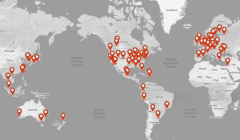Despite Cosmetic Reforms, U.S. Department of State Says Human Rights in China Backsliding
Report Details Continued Severe Persecution of Falun Gong

The U.S. State Department says Chinas human rights is backsliding as severe persecution of Falun Gong continues.
WASHINGTON, DC (FDI) – The 2003 Department of State Annual Human Rights Report issued last week, points to China’s degenerating rights practices, some cosmetic beautification not withstanding. (China section)
“Although legal reforms continued, there was backsliding on key human rights issues during the year,” says the report.
One of these key issues is Falun Gong. As in previous years, the severe persecution of the practice is a central concern throughout much of the report, with extensive citing of torture, arbitrary detention, and unlawful killing, as well as denial of freedom of religion, speech, assembly, and association.
The report further details widespread abuse of Catholics, Tibetans, Uighurs, journalists, democracy advocates, as well as AIDS/HIV and Internet freedom activists in China. The Department of State (DOS) released these findings on February 25 as part of its summary on the global human rights condition. Its section on China emphasizes the façade of the Chinese legal system.
A Politically Controlled Legal System
“The Constitution provides for an independent judiciary,” says the report. “However, in practice, the Government and the CCP, at both the central and local levels, frequently interfered in the judicial process and directed verdicts in many high-profile cases.”
The case of Dr. Charles Lee (news), a U.S. Citizen still imprisoned in China after undergoing a show trial, corroborates the DOS’s assertion about the politicization of China’s legal system. The DOS report points out that in sensitive cases like Lee’s, which normally last only a few hours, courts pass guilty verdicts directly after proceedings.
Moreover, police blocked defendants’ right to seek counsel and, like Lee, defendants found it hard to find a lawyer. Only one in seven defendants had one, and the attorneys who attempted to fully defend their clients faced abuse by police and prosecutors. Witnesses were involved in less than 5 percent of trials, “the conviction rate in criminal cases remained at approximately 90 percent, and trials generally were little more than sentencing hearings.”
“Police and prosecutors subjected many prisoners to torture and severe psychological pressure to confess,” says the report. These “confessions” were then used as evidence.
Crocodile Tears for Torture, SARS
Chinese law forbids the practice of torture, and in recent months the Chinese Government declared that it is undergoing a campaign to stop the use of torture in its facilities. At the same time, however, Chinese authorities continue denying that any Falun Gong practitioners are being tortured, even as daily reports from China (website) detail continued torture and killings of Falun Gong practitioners throughout the country.
Torture by Chinese police and security personnel is continuing, says the DOS Bureau of Democracy, Human Rights, and Labor, which issued the report. “Several hundred Falun Gong adherents reportedly have died in detention due to torture, abuse, and neglect since the crackdown on Falun Gong began in 1999.”
Senior Chinese officials, according to the report, acknowledged that torture was a serious problem but were unable to take measures to stop it.
“Those Chinese officials’ comments are, at best, misleading” says Falun Dafa Information Spokesman Erping Zhang. “The widespread torture and killing of Falun Gong practitioners isn’t the product of poorly educated policemen or corrupt officials in a few cities. It’s a state policy ordered by former Chinese leader Jiang Zemin and a small circle of his supporters.”
Similarly, the DOS report questions whether the Chinese Government learned a lesson from SARS or merely continued to put on a show. While some praised the Chinese Government for admitting its mistake covering up SARS and finding several people to hold responsible, the DOS report points out that, even long after apologizing, the government continued to place sanctions on publications that reported freely on SARS
Moreover, the Chinese Government used the opportunity SARS created to arrest hundreds of Falun Gong practitioners and to embark on a new media campaign against Falun Gong.
Paper Freedoms
On paper, China’s Constitution guarantees its citizens freedom of belief, assembly, press and speech. Yet, the DOS report concludes that “the Government tightly restricted these rights in practice.”
While being detained in China, U.S. Citizen Albert Roman was more bluntly told by a Chinese policeman: “We don’t follow the constitution.”
Officially, the Chinese Government denies detaining political prisoners. But according to a human rights organization cited by the DOS there were more political prisoners in China in 2003 than at any time during the previous decade.
In spite of its claims for improvements in its human rights record, as expressed in a press conference protesting the DOS’s submission, the Chinese Government continues to forbid both domestic and foreign NGOs from monitoring its human rights conditions first-hand. It did promise to allow the U.N. Special Rapporteur for Torture to visit China. But the visit never materialized since the Chinese Government refused to allow the international representative to visit any facilities without prior notice.
Information Control
The Chinese Government has also moved to restrict Internet usage with what is believed to be the largest Internet police force in the world. The Government has also announced plans to control instant text messaging systems.
Information from international media has also been blocked from entering the People’s Republic. According to the report, radio signals broadcasting Voice of America, Radio Free Asia, and BBC continue to be jammed by the Chinese Government.
The Committee to Protect Journalists declared China the “world’s leading jailer of journalists,” and the DOS stated that reporters inside China are severely restricted in their coverage of Falun Gong or other sensitive topics. Meanwhile, “The Government continued an intense propaganda campaign against the Falun Gong.”








